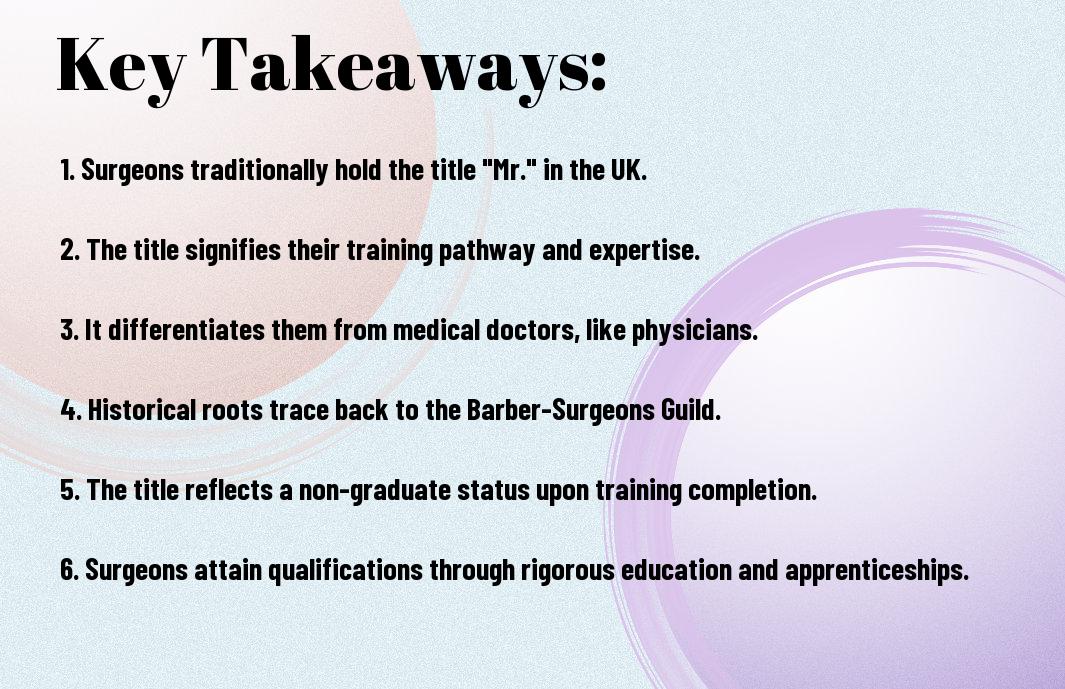Just like many medical traditions, the title ‘Mr.’ for surgeons has historical roots that may surprise you. This practice dates back to the time when surgeons were considered craftsmen, not formally educated doctors, and thus did not hold the title of ‘Doctor.’ Instead, they were addressed as ‘Mr.’ to signify their apprenticeship and skill in surgery. Understanding this distinction can give you a deeper appreciation for the evolution of modern surgery and the professional hierarchy within medicine today.
Key Takeaways:
- Tradition: The title ‘Mr.’ for surgeons stems from historical conventions in the United Kingdom, distinguishing them from medical doctors (MDs).
- Training Path: Surgeons typically undergo a different training path, including years of specialized surgical training after qualifying as a doctor.
- Respect: The title ‘Mr.’ is a mark of respect and signifies that surgeons have completed extensive training in surgery.
- Gender-Neutral: The use of ‘Mr.’ is gender-neutral in the context of surgery and is used for both male and female surgeons.
- Hierarchy: It reflects the professional hierarchy in medicine, where surgeons position themselves distinctively from other medical practitioners.

Historical Origins of the Title
Your understanding of why surgeons are often called ‘Mr.’ can be traced back to medieval England. At that time, surgery was viewed as a manual craft, akin to trades like blacksmithing or carpentry. Surgeons were trained through apprenticeships rather than in universities, which distinguished them from medical doctors, who held university degrees and were entitled to the title ‘Doctor.’ This delineation led to the legacy of referring to surgeons as ‘Mr.’, a tradition that persists in many countries today, emphasizing the distinction between surgical and medical professions.
The Distinction Between Surgeons and Physicians
Some key differences separate surgeons from physicians. While both are medical professionals, surgeons focus on performing operations, while physicians provide general medical care and treatment. You may notice that surgeons often hold the title of “Mr.” or “Ms.” after completing their surgical training, reflecting their advanced skills in surgery that distinguish them from traditional doctors. For more insights into this unique title, you can explore Why Are Male Surgeons Referred To As Mister Instead Of …. This distinction adds an important layer of understanding to the roles within the medical community.

The Role of the Royal College of Surgeons
Even if you are not in the medical field, understanding the significance of the Royal College of Surgeons (RCS) can clarify why surgeons are referred to as “Mr.” The RCS establishes the standards for surgical education and practice in the UK, overseeing specialized training and ensuring that only qualified individuals can perform surgery. When you see a surgeon, know that they have gone through a rigorous process, including examinations and training, to earn their esteemed title. This institution plays a pivotal role in maintaining the high standards of surgical excellence that you would expect in healthcare.
The Impact of Surgical Training and Qualifications
If you are considering a career in surgery, understand that your training and qualifications significantly shape your professional identity. Surgeons typically undergo extensive education, culminating in a Master’s equivalent qualification, which sets them apart from medical doctors who hold the title of ‘Doctor.’ This distinction reflects the rigorous, hands-on surgical training you receive, including years of residency and specialized practice, ultimately reinforcing the shift from ‘Doctor’ to ‘Mr.’ as a mark of expertise and commitment in the field of surgery.
Contemporary Perceptions of the Title
While the title “Mr.” may seem outdated in our modern society, it still holds significance in the surgical field. You might find that some patients prefer using “Mr.” or “Ms.” when addressing their surgeons, reflecting a sense of professionalism and respect. This preference can be rooted in tradition, yet it also marks a distinction between the roles of surgeons and those of medical doctors, like physicians, who use the title “Dr.” Understanding this difference can enhance your appreciation for the surgical profession and the longstanding customs that shape your experiences in healthcare.
Regional Variations in Terminology
Not every country follows the same conventions when addressing surgeons. In countries like the United Kingdom, surgeons are typically referred to as ‘Mr.’ or ‘Ms.’ after completing their training, signaling their status as independent practitioners. However, in the United States, it’s common to address surgeons as ‘Doctor,’ regardless of their specialty. If you travel or work internationally, being aware of these regional variations in terminology can enhance your understanding of the medical hierarchies and improve your communication with healthcare professionals worldwide.
Conclusion
Upon reflecting on the tradition of referring to surgeons as “Mr.,” you gain insight into the historical distinctions within the medical profession. This title signifies their rigorous training and expertise beyond medical school, highlighting their role as experts in surgery. It reinforces the deep-rooted respect for surgical skills and embodies the values of the profession. By understanding this terminology, you appreciate the unique journey surgeons undertake, as well as the significance of their position within the healthcare system.
Q: Why are many surgeons referred to as ‘Mr.’ instead of ‘Doctor’?
A: Traditionally, surgeons in the UK and some other countries are addressed as ‘Mr.’, ‘Mrs.’, or ‘Ms.’ after completing their medical training. This practice stems from the historical distinction between surgeons and physicians. Surgeons were once considered tradesmen and did not attain a university degree initially. Instead, they became part of the trade guilds. Consequently, they adopted the title ‘Mr.’ or ‘Mrs.’ to reflect their status, as it was deemed a step above the designation of ‘Doctor’, which was primarily used for physicians who completed their MD programs. Over time, this custom has persisted, and even after becoming fully qualified doctors, surgeons continue to use the title ‘Mr.’ or ‘Ms.’ as a nod to their historical roots.
Q: Does the title ‘Mr.’ indicate that a surgeon lacks higher medical qualifications?
A: No, the title ‘Mr.’ does not imply that surgeons lack higher medical qualifications. In fact, surgeons are fully qualified medical doctors who have completed medical school and then pursued additional years of specialized training in surgery. After earning their medical degree, they undertake rigorous training, often referred to as a surgical residency, to become proficient in surgical procedures. The title ‘Mr.’ is simply a traditional designation and does not signify inferior education or expertise. Today, many surgeons hold advanced qualifications and specialized certifications.
Q: Are there exceptions to the ‘Mr.’ title for surgeons?
A: Yes, there are exceptions to the ‘Mr.’ title among surgeons, particularly in some countries and special circumstances. For example, in the UK, female surgeons may choose to retain ‘Ms.’ or sometimes prefer ‘Dr.’ Following recent changes in medical practice, some surgeons, regardless of gender, will opt to use ‘Dr.’ to affirm their medical doctor status. Additionally, in fields such as dentistry and certain surgical specialties within different regions, practitioners may hold titles that reflect their specific training and qualifications. Ultimately, a surgeon’s title may vary depending on personal choice, regional practices, and cultural context.






